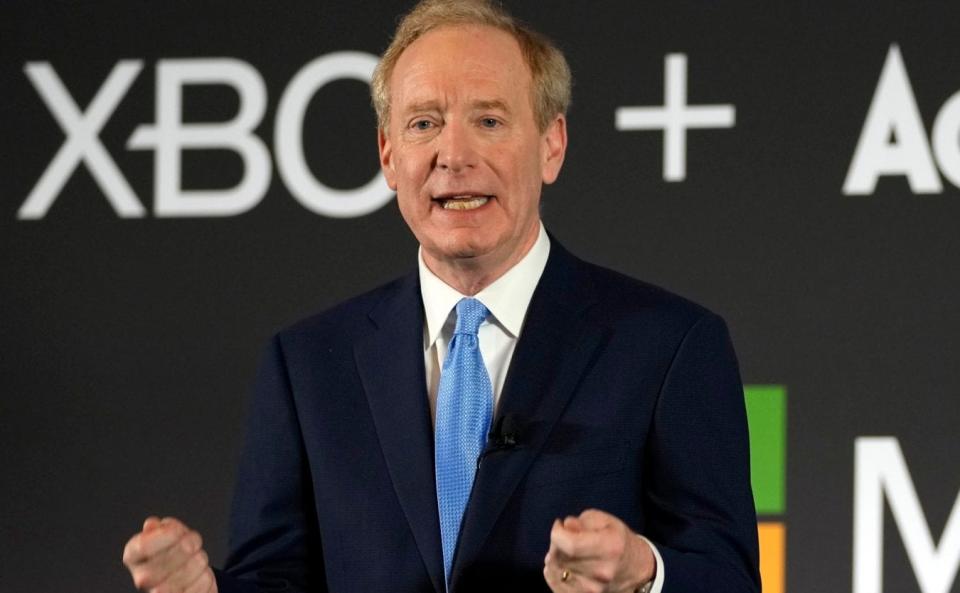
And there I was thinking that the Brexit rallying call of “take back control” did at least mean that the UK economy might finally free itself from the leviathan of oppressive, growth destructive, European regulation.
But what’s this?
It is as though Britain is in competition with the EU over quite how punitively politically suspect – though entirely legitimate – business activity might be treated.
Our now shackles-free British rulemakers have in short order prohibited Microsoft’s $70bn (£56bn) takeover of the gaming company Activision Blizzard, and coincidentally proposed a plethora of nanny-state measures to crack down on a supposedly delinquent gambling industry.
In both cases, this seems to be more a case of taking back control so as to exercise more of it than freeing business from the well-intentioned but enterprise-crushing burden of EU constraint.
To have left the European Union only to become more like it seems an odd path to tread.
It says a lot about the deficiencies at the heart of the UK economy that gaming and online gambling are in fact two of Britain’s most successful industries.
According to the Competition and Markets Authority, the gaming industry alone is the UK’s largest revenue-generating form of entertainment, with around £5bn in annual revenue, or more than pay TV, video streaming, cinema, music and books.
Only last week, the Prime Minister and the Chancellor hosted a celebratory event in Downing Street for Britain’s gaming pioneers; the irony of the timing, just as Microsoft President Brad Smith was angrily accusing the UK of being “closed for business” and Activision warned it was reassessing its investment in Britain, was according to reports entirely lost on the Prime Minister, who gleefully immersed himself in an array of show cased made in Britain games, apparently oblivious to the blizzard of condemnation that had greeted the CMA’s decision.

Some of these strictures, which come overwhelmingly from the two parties with the most to lose, should no doubt be treated sceptically.
The CMA’s decision has effectively scuppered the entire deal, with limited chances of reversal on appeal. It is understandable that Microsoft, which has been working on the transaction for the best part of two years and sees it as key to the company’s future, should be angry.
But has confidence in the UK really been as “severely shaken” as Mr Smith claims?
This seems a little far fetched. There are surely much bigger threats to Britain’s “world beating” position in gaming content – tax and the wider regulatory framework for business prime among them – than this.
Microsoft is substantially invested in the UK, and has spent decades building its presence here. It is not about to write this off in a petulant fit of pique, and nor is Activision, which is similarly a big employer in the UK.
In order to get the deal through, they could conceivably quit the UK market for cloud gaming, but this would be difficult, if not impossible.
The threat of such action none the less raises a serious point.
The European authorities have, perhaps surprisingly, taken a much more relaxed view of the Activision takeover than the CMA, and indeed seemed minded to accept the very same behavioural remedies proposed by Microsoft that the CMA has rejected.
Indeed, were it not for Brexit, the CMA would have had little or no traction on the merger in the first place, even if admittedly it could have fed into the European judgment.
As it is, the CMA is fast establishing itself as the world’s most hawkish global enforcer, and what is more, one with the powers to ensure that its actions actually have some effect.
If the UK gets a reputation for constantly sticking its oar in, and unfairly prohibiting mergers that are regarded more favourably elsewhere, it will in time act as a deterrent to business investment in the UK.
Think of it like this: if Norway was to put its foot down and banned Microsoft from acquiring Activision, nobody would bat an eyelid.
Microsoft and Activision would simply close their businesses in Norway and move on, little or no harm done to their merger or ongoing business activity. Norway is too small to matter.
Yet if the EU were to do the same, the two companies would have no option but to abandon the merger. The EU is the biggest consumer market in the world, and even the mighty Microsoft cannot afford to be out of it.
The UK sits somewhere in between. It is too large a market for Microsoft to easily bypass, but not so large that it would be unthinkable.
If you believe your plans are going to be constantly scuppered by UK enforcers, you will in time take steps to disengage from the jurisdiction.
Nor is it just big multinational corporations where this way of thinking might apply.
Smaller, entrepreneurial ventures, like, say, the very same gaming content providers the UK is so good at spawning, might think twice about investing here if they thought attempts to sell the business might be blocked.
The CMA’s actions also look disproportionate on the specifics of the deal.
The CMA finds no reason to block the takeover when it comes to console gaming, which currently accounts for the overwhelming bulk of the $280bn a year global market.
Rather it is Microsoft’s potential for dominating cloud gaming – widely recognised as the future once current technical and capacity constraints are overcome – that the CMA worries about.
Those concerns are instructed by the network effects of Microsoft’s already market leading positions in operating systems and cloud computing, and rightly so in some respects.
Similar disquiet has been raised about the potential for “big tech” to dominate the nascent technology of generative AI.
Furthermore, tech giants such as Microsoft are notorious for gobbling up innovative players in order to snuff out potential future competition.
Yet in effectively deciding that big tech should be banned from future takeovers, the CMA’s Sarah Cardell has in essence substituted her own judgement for that of the markets, where for the moment there is no competition issue of significance.
Truth be told, the CMA has as little idea as you and me how these markets might evolve.
The only two significant complainants were Sony and Google, both of whom have skin in the game, and are not averse to using regulators to protect their own incumbent positions.
I note that Ian Livingstone, who as co-founder of Games Workshop can reasonably claim to be the godfather of British gaming, seems relatively unconcerned about Microsoft’s ambitions.
Indeed, many UK content providers see Microsoft’s assault on cloud gaming as more of an opportunity than a threat, opening up potentially vast new markets beyond the exclusivity and anti-competitive practices of consoles.
Let’s protect consumers from egregious big tech by all means, but not on the basis of imagined threats or at the expense of desperately needed investment in UK tech.









